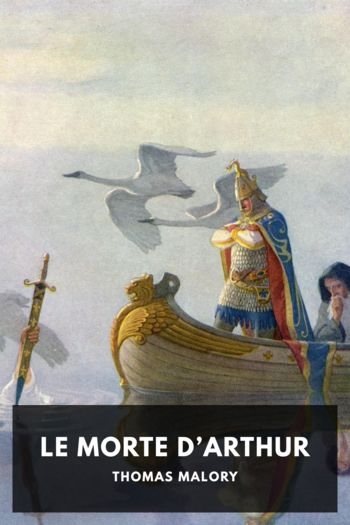Le Morte d’Arthur - Thomas Malory (best android ereader TXT) 📗

- Author: Thomas Malory
Book online «Le Morte d’Arthur - Thomas Malory (best android ereader TXT) 📗». Author Thomas Malory
Malory died leaving his work obviously unrevised, and in this condition it was brought to Caxton, who prepared it for the press with his usual enthusiasm in the cause of good literature, and also, it must be added, with his usual carelessness. New chapters are sometimes made to begin in the middle of a sentence, and in addition to simple misprints there are numerous passages in which it is impossible to believe that we have the text as Malory intended it to stand. After Caxton’s edition Malory’s manuscript must have disappeared, and subsequent editions are differentiated only by the degree of closeness with which they follow the first. Editions appeared printed by Wynkyn de Worde in 1498 and 1529, by William Copland in 1559, by Thomas East about 1585, and by Thomas Stansby in 1634, each printer apparently taking the text of his immediate predecessor and reproducing it with modifications. Stansby’s edition served for reprints in 1816 and 1856 (the latter edited by Thomas Wright); but in 1817 an edition supervised by Robert Southey went back to Caxton’s text, though to a copy (only two are extant, and only one perfect!) in which eleven leaves were supplied from Wynkyn de Worde’s reprint. In 1868 Sir Edward Strachey produced for the present publishers a reprint of Southey’s text in modern spelling, with the substitution of current words for those now obsolete, and the softening of a handful of passages likely, he thought, to prevent the book being placed in the hands of boys. In 1889 a boon was conferred on scholars by the publication of Dr. H. Oskar Sommer’s page-for-page reprint of Caxton’s text, with an elaborate discussion of Malory’s sources. Dr. Sommer’s edition was used by Sir E. Strachey to revise his Globe text, and in 1897 Mr. Israel Gollancz produced for the “Temple Classics” a very pretty edition in which Sir Edward Strachey’s principles of modernisation in spelling and punctuation were adopted, but with the restoration of obsolete words and omitted phrases. As to the present edition, Sir Edward Strachey altered with so sparing a hand that on many pages differences between his version and that here printed will be looked for in vain; but the most anxious care has been taken to produce a text modernised as to its spelling, but in other respects in accurate accordance with Caxton’s text, as represented by Dr. Sommer’s reprint. Obvious misprints have been silently corrected, but in a few cases notes show where emendations have been introduced from Wynkyn de Worde—not that Wynkyn had any more right to emend Caxton than we, but because even a printer’s conjecture gains a little sanctity after four centuries. The restoration of obsolete words has necessitated a much fuller glossary,1 and the index of names has therefore been separated from it and enlarged. In its present form the index is the work of Mr. Henry Littlehales.
A. W. Pollard.
Preface of William CaxtonAfter that I had accomplished and finished diverse histories, as well of contemplation as of other historial and worldly acts of great conquerors and princes, and also certain books of ensamples and doctrine, many noble and diverse gentlemen of this realm of England came and demanded me many and oft times, wherefore that I have not do made and imprint the noble history of the Saint Greal, and of the most renowned Christian king, first and chief of the three best Christian, and worthy, King Arthur, which ought most to be remembered among us Englishmen to-fore all other Christian kings; for it is notoyrly2 known through the universal world, that there be nine worthy and the best that ever were, that is to wit, three Paynims, three Jews, and three Christian men. As for the Paynims, they were to-fore the Incarnation of Christ, which were named, the first Hector of Troy, of whom the history is comen both in ballad and in prose, the second Alexander the Great, and the third Julius Caesar, Emperor of Rome, of whom the histories be well known and had. And as for the three Jews, which also were to-fore the incarnation of our Lord, of whom the first was duke Joshua which brought the children of Israel into the land of behest, the second David king of Jerusalem, and the third Judas Machabeus, of these three the Bible rehearseth all their noble histories and acts. And since the said Incarnation have been three noble Christian men, stalled and admitted through the universal world into the number of the nine best and worthy. Of whom was first the noble Arthur, whose noble acts I purpose to write in this present book here following. The second was Charlemain, or Charles the Great, of whom the history is had in many places, both in French and in English. And the third and last was Godfrey of Boloine, of whose acts and life I made a book unto the excellent prince and king of noble memory, King Edward the Fourth.
The said noble gentlemen instantly required me to imprint the history of the said noble king and conqueror King Arthur, and of his knights, with the history of the Saint Greal, and of the death and ending of the said Arthur; affirming that I ought rather to imprint his acts and noble feats, than of Godfrey of





Comments (0)